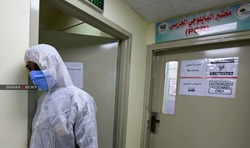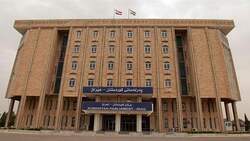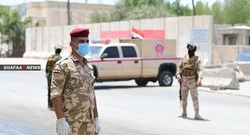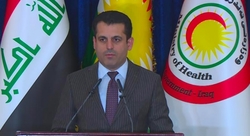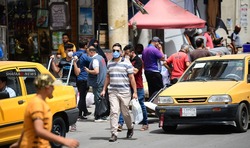2020, A Rough Year in the third millennium

Shafaq News / The year 2020 has certainly took a major share of historical world events from wars and political world-changing events, to a blurry Health pandemic.
Shafaq News Agency lists the major events that have happened in this year so far
Covid-19 Pandemic
COVID-19 has been in the public eye since almost the biginning of the year, when The World Health Organization announced that a deadly coronavirus had emerged in Wuhan, China.
Just in months, the virus has spread across the globe. The novel coronavirus outbreak was described as a “pandemic” by WHO in March affecting more than 20 million people and causing the death of at least 751,000.
The COVID-19 pandemic has completely changed our lives, individually in meeting with handshake and hugs and globally in suspending multiple economic and political activities.
As the year 2020 drew to a close, Covid-19 may be up to 70% more transmissible due to its new strain which being discovered in Britain - and then spread to several European countries as well as Australia and other countries.
In an encouraging development, vaccines had been developped, the most prominent are BioNTech-Pfizer which was given FDA approval and Moderna.
The UK was the first country in the world to approve the BioNTech-Pfizer vaccine, and began administering doses on December 8.; Yet it is not clear whether 2021 will mark the COVİD-19 pandemic’s end.
Economic Fallout
However, the world economy has been hit hard from the Pandamic. It is estimated that more than 100 million people have entered extreme poverty as Covid-19 throws global economy into deeper decline.
Tourism, travel, and industrial output have been heavily disrupted, while oil and gas prices have sharply deteriorated.
US’ Trump
The U.S. President, Donald Trump loss to Democrat Joe Biden could be one of the most important events of 2020.
Biden became the 46th president of the United States on Nov. 7, amid Trump’s rejection to admit, he said the election was marred by widespread fraud; a political phenomenon unique in the country.
In addition, the death of George Floyd under a cop's knee in May 25 which sparked mass underscored Trump's chances of winning, as he has adopted a hardline approach to the protests and threatened to deploy the U.S. military to quell violent dissent.
The crime exposed a rift in the American society’s structure as massive protests over Floyd’ death circulated in many U.S. cities and led to the “Black Lives Matter movement” in various European and African cities.
Beirut Blast
August 4th was a horrible day; when the “largest non-nuclear explosions on earth” – as described by experts- occurred after a fire broke out at a warehouse storing hundred of tons of ammonium nitrate in Beirut Port, resulting in 200 deaths and thousands of injured, as well as damaged buildings, flying debris, and wrecked cars and furniture in the Lebanese Capital.
Arabic-Israeli normalization
US-Supported agreements were signed between Israel and several arab countries.
On September 15th, the United Arab Emirates (UAE) and Bahrain signed normalization agreements with Israel during a Trump-sponsored ceremony in the White House - attended by Israeli Prime Minister, Benjamin Netanyahu and the foreign affairs ministers of the UAE and Bahrain.
Trump promised the Americans and the world that six or seven other countries would join the process of normalization.
However, he always repeated that Iran would come to negotiate with him - either before the U.S. elections, or immediately after - as he would win the elections and Iran's bet on a possible Biden victory will fail.
That did not happen, despite a series of US economic and financial sanctions imposed on Tehran that severely damaged Iran's economy. It was clear that Iran was betting on Trump’s loss to start over the negotiotations with the new US administration.
As for relations with Israel, Sudan followed the UAE and Bahrain. On October 23rd - a day after an official Israeli delegation visited Khartoum – normalizing the Sudanese-Israeli relations was announced in a televised press conference attended by the US president, the Israeli Prime Minister, the head of Sudan's sovereign council, and the Sudanese Prime Minister.
The deal included that Khartoum sets aside about $350 million to pay to American victims of militant attacks and their families while the United States would remove Sudan from its list of state sponsors of terrorism.
Sudan was accused of dealing with Al-Qaeda, and thus directly responsible for the attacks on the U.S. embassy in Kenya and Tanzania, as well as the bombing of the USS Cole destroyed off Yemen's coast.
Another normalization agreement was signed with Morocco on December 10th, when Trump tweeted, "Another historic achievement; two of our greatest friends, Israel and Morocco, have agreed on full diplomatic relations”.
Morocco's decision to normalise ties with Israel has handed Rabat its biggest step yet towards the prize it values most - global recognition of its claim to Western Sahara.
Indeed, the Arab normalization and peace agreements with Israel are not new, as Egypt signed the Camp David agreement in 1979, then the Palestine Liberation Organization (PLO) signed the Oslo Accords in 1993, followed by Jordan in the Wadi Araba Treaty. But the Arab’s rapprochement with Israel raised questions about its timing and political circumstances; especially when successive Israeli governments paid no heed to the “Arab peace initiative” and keep imposing strict conditions over the Palestinians.
UK withdrawal from the EU
The year 2020 began with the United Kingdom’s (UK) withdrawal from the European Union and the European Atomic Energy Community on January 31st as a result of the 2016 British referendum what confused the European countries relations and led to economic repercussions.
US withdrawal from Afhganistan
On the Afghan war front, an agreement between the U.S. and the Taliban Movement was announced on February 29th to underscore Trump's desire to pull out the US Forces from the “endless wars” –as he described it-. The Pentagon has already announced a plan to slash troop levels to 2,500 in Afghanistan.
Afghan negotiations, in the presence of the Americans, have been launched in Doha, Qatar, to arrange the post-military withdrawal period.
Nagorno-Karabakh conflict
In 2020, a serious war was launched in Nagorno-Karabakh; where clashes broke out on September 27th and developed into all-out fighting on the frontlines in the disputed region between Turkey-backed Azerbaijan and the Armenian-backed Armenian minority.
This war’s seriousness which is the first in more than 20 years was due to Turkey’ intervention in support of Azerbaijani armed forces. There were serious concerns about other parties’ involvement, including Russia and Iran. While Ankara was accused of facilitating thousands of Syrian opposition fighters’ passage, to take part in the war in support of the Azerbaijani forces.
The war left more than 5,000 deaths and Armenia’ loss of a large territory, while Russia arranged a ceasefire agreement between the two sides in November.
Belarus Elections
In August, a political crisis erupted in Belarus after President Alexander Lukashenko won the presidential election on Aug. 9 which protesters say he massively rigged to ensure a phoney landslide win.
The demonstrations last for weeks. Lukashenko asked a Russian military help and several opposition leaders fled the country, while others were arrested.
Caesar Act
In Syria, the most significant development was the toughest U.S. sanctions (Caesar Act) which came into force last June prohibiting foreign companies trading with Damascus. Caesar Act negatively affected the Syrian economy after it suffered of a rapidly accelerating free-fall against the dollar.
Libya
In Libya, General Khalifa Haftar failed to take control of the capital Tripoli due to the direct Turkish military intervention in favor of the government of National Accord in Libya.
the war still an option, because months of negotiations in Berlin, Bouznika and Tangier, Switzerland, and then in Tunisia have not turned the page on a new agreement among the parties.
Concerns of renewed attempts of the Government of National Accord to seek to take back control over Libya's “oil crescent” are raised.
Mali
Africa witnessed a major event, the August 18th, Malian president Ibrahim Boubacar Keita was overthrown in a military coup. A transitional government was formed to lead the country to elections, led by Retired colonel Bah Ndaw in October, to restore order to Mali’s state institutions.
Ethiopia
It has been fighting in the northern Tigray region after the Tigray People's Liberation Front (TPLF) was accused of attacking army positions. This crisis displaced tens of thousands of Ethiopians to Sudan.
Thailand
In Thailand, mass demonstrations have erupted calling for democracy, the government’s resignation, the writing of a new constitution, and reforms in the monarchy.
Massive fires and floods
Massive fires had devoured more than 100,000 square kilometers of Australia's land and forests in the end of January 2020.
Fires also broke out on the borders of Argentina, Paraguay, Bolivia, and southern Brazil. There have also been fires in California and in some parts of the western U.S. due to high temperatures.
Devastating floods hit 16 Sudanese states in September which affected more than 500,000 people, and destroyed more than 100,000 houses.
New Governances
Meanwhile, there have been changes in governance in several countries, including Oman; whose sultan, Qaboos bin Saeed died and was succeeded by Haitham bin Tariq Al-Saeed.
Kuwait's prince, Sheikh Sabah Al-Ahmad Al-Jaber Al-Sabah has died, and Crown Prince Nawaf Al-Ahmad Al-Jaber Al-Sabah has taken office.
A new Syrian government, headed by Hussein Arnos, was formed on August 30th, following legislative elections on July 19th.
Bahrain's Crown Prince Salman bin Hamad took over as Prime Minister, succeeding the late prince, Khalifa bin Salman Al-Khalifa, who died on November 11th.
Syrian Foreign Minister and Deputy Prime Minister, Waleed Al-Mo’allim died on November 16th and was succeeded by Deputy Foreign Minister Faisal Al-Miqdad.
Maradona
On November 25th, Football legend, the Argentine’ Diego Maradona died on Wednesday at his home in Argentina after suffering a heart attack and he was buried in a cemetery on the outskirts of Buenos Aires.
According to many people, 2020 is the most difficult year, a central ambition is to build a global coalition to find solutions to these consecutive crises.

